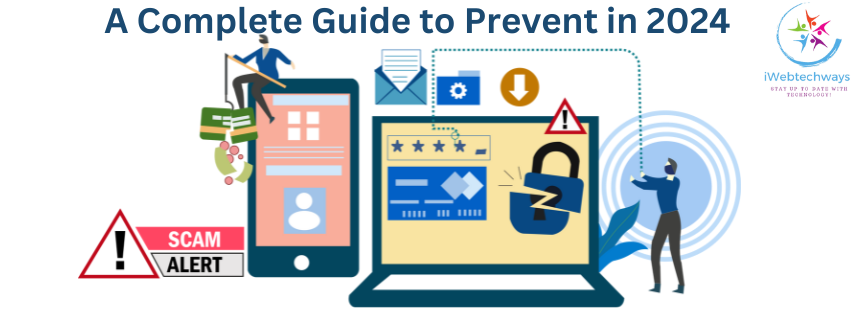As technology continues to evolve, so do the tactics of cybercriminals. Online scams have become increasingly sophisticated, targeting unsuspecting individuals and businesses alike. Whether it’s through emails, social media, or online marketplaces, scammers are finding new ways to trick people into giving up their money or personal information. In this article, we’ll cover the most common online scams in 2024 and provide tips on how to prevent falling victim to them.
1. Phishing Scams
How it works: Scammers pose as legitimate organizations, such as banks, tech companies, or government agencies, and send emails, texts, or social media messages to trick recipients into sharing sensitive information like passwords, credit card numbers, or personal identification.
How to prevent it:
- Always verify the sender’s email address before clicking on any links or attachments.
- Avoid clicking on suspicious links or providing personal information via email.
- Enable two-factor authentication (2FA) on your accounts for an extra layer of security.
- Use spam filters to block phishing emails from landing in your inbox.
2. Fake Online Shopping Websites
How it works: Fraudulent websites mimic well-known online stores, offering products at incredibly low prices. Victims pay for goods that either never arrive or are counterfeit.
How to prevent it:
- Shop only on reputable websites with HTTPS encryption (look for the padlock symbol in the URL bar).
- Research the company or seller before making a purchase, especially if the deal seems too good to be true.
- Use credit cards or secure payment gateways (like PayPal) that offer buyer protection.
- Check for reviews and feedback from other buyers.
3. Cryptocurrency and Investment Scams
How it works: Scammers promise high returns on investments, especially in cryptocurrency. They often create fake trading platforms or use social media influencers to lure victims into Ponzi schemes, which collapse once they have enough funds.
How to prevent it:
- Be skeptical of investment offers that promise guaranteed returns, especially in volatile markets like cryptocurrency.
- Only invest through regulated, well-known financial institutions or platforms.
- Conduct thorough research before investing in any new opportunity.
- Be wary of unsolicited investment advice from unknown sources.
4. Romance Scams
How it works: Scammers create fake profiles on dating apps or social media, engaging in long-term communication with victims to gain their trust. Once they establish a bond, they ask for money, often citing emergency situations or the cost of traveling to meet the victim.
How to prevent it:
- Be cautious of individuals who ask for money online, even if you’ve been in contact with them for a long time.
- Avoid sharing personal information too quickly when interacting with someone online.
- Do a reverse image search of the person’s profile picture to check for impersonation.
- Report suspicious activity to the dating platform or social media site.
5. Tech Support Scams
How it works: Scammers pose as tech support agents from companies like Microsoft or Apple, claiming that your device has been infected or compromised. They request remote access to your computer to “fix” the problem, which allows them to steal data or demand payment.
How to prevent it:
- Legitimate tech companies will never contact you out of the blue to offer support.
- Avoid giving remote access to anyone unless you are sure of their identity.
- Hang up or delete emails from anyone claiming to offer unsolicited tech support.
- Install and regularly update antivirus software to protect against malware.
6. Fake Job Scams
How it works: Scammers create fake job postings or send unsolicited job offers that require job seekers to pay for background checks, training, or equipment. Once the fee is paid, the job and the scammer disappear.
How to prevent it:
- Research the company and verify the job offer before providing personal information or payment.
- Be cautious of jobs that require upfront fees or ask for sensitive details early in the application process.
- Legitimate employers will not ask you to pay for a job interview or training.
- Check for grammatical errors and inconsistencies in job offers or emails.
7. Business Email Compromise (BEC)
How it works: Cybercriminals spoof or hack into company email accounts, particularly those of executives or finance departments, and send requests for wire transfers or sensitive information. These emails appear to come from a trusted source within the company.
How to prevent it:
- Use two-factor authentication (2FA) for all company email accounts.
- Train employees to recognize phishing attempts and suspicious email requests.
- Verify any unusual financial requests through a secondary communication channel (e.g., a phone call).
- Regularly update email security protocols and firewalls.
8. Ransomware Attacks
How it works: Ransomware is malware that locks users out of their systems or encrypts files, demanding payment (usually in cryptocurrency) to restore access. It often spreads through email attachments or malicious downloads.
How to prevent it:
- Backup your data regularly to an offline or cloud-based solution.
- Keep your operating systems and software up to date with the latest security patches.
- Avoid downloading attachments or clicking on links from unknown or suspicious sources.
- Install and regularly update anti-malware software.
9. Fake Charity Scams
How it works: Scammers set up fake charities, often in response to natural disasters or crises, to solicit donations from generous individuals. These donations are then pocketed by the scammer.
How to prevent it:
- Only donate to registered, well-known charities.
- Verify the legitimacy of charities through websites like Charity Navigator or Guidestar.
- Be cautious of charities soliciting donations via phone, email, or social media, especially if they ask for payment through gift cards or wire transfers.
- Always make donations directly through official charity websites.
10. Social Media Impersonation Scams
How it works: Scammers create fake profiles impersonating celebrities, influencers, or even friends and family. They use these profiles to ask for money, promote fake products, or spread phishing links.
How to prevent it:
- Be cautious of unexpected messages asking for money or personal information.
- Verify the identity of people reaching out to you by contacting them through an alternate method.
- Report impersonation attempts to the social media platform immediately.
- Avoid clicking on suspicious links shared through social media messages.
Conclusion: Stay Informed and Vigilant
Online scams are constantly evolving, but by staying informed and practicing caution, you can protect yourself from falling victim. Always double-check the legitimacy of online offers, job opportunities, and communications. Use security tools like antivirus software and two-factor authentication to add an extra layer of protection. Remember, if something sounds too good to be true, it probably is. Staying vigilant online is the key to avoiding scams in 2024 and beyond.











